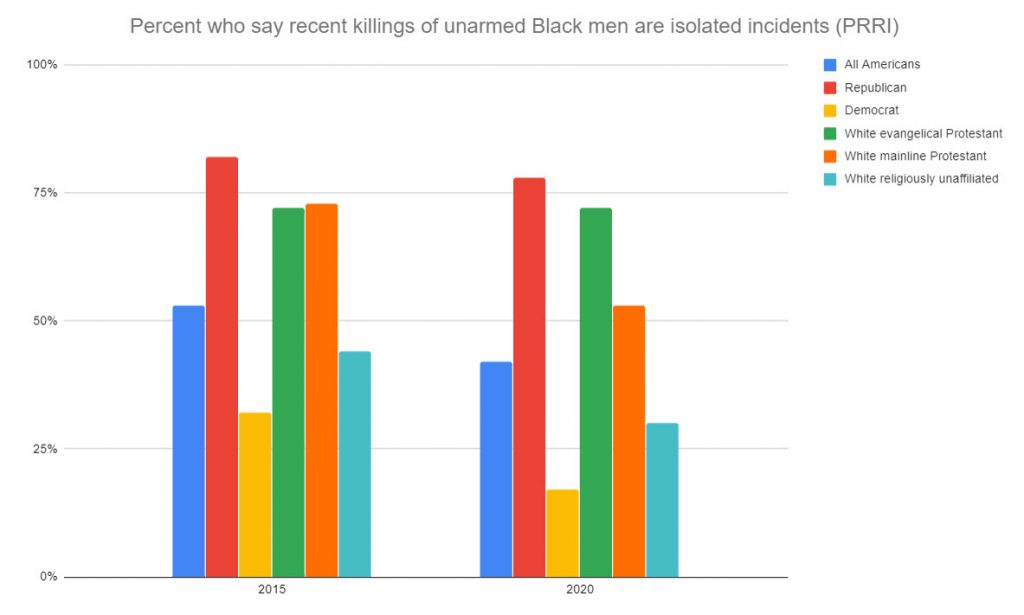Last week Public Religion Research Institute published “Summer Unrest over Racial Injustice Moves the Country, But Not Republicans or White Evangelicals.”
The article begins with an exploration perceptions of police killings of unarmed black men over the last five years. Based on surveys conducted in October 2015, October 2018, and June 2020 the trend is toward fewer Americans believing that recent killings of unarmed Black men are isolated incidents and a greater and greater number believing that such killings are part of a broader pattern of how police treat Black Americans.
While the trend is moving in a direction that aligns with the widely published statistical reality of this form of racial injustice, progress has been slow and unequal among varying demographic groups.
Among those surveyed the percentage who held a view that recent killings of unarmed Black men are isolated incidents fell 11% over the last five years:
- 2015: 53%
- 2018: 45%
- 2020: 42%

Political Affiliation
PRRI found that Republicans were the most likely to hold the view that such killings were isolated incidents:
- 2015: 82%
- 2018: 77%
- 2020: 78%
Democrats were the least likely to hold this view with the percentage dropping from 32% in 2015 to 26% in 2018 to 17% in 2020.
Independents consistently fell between Republicans and Democrats with the percentage dropping from 55% in 2015 to 45% in 2018 to 39% in 2020.
Religious Affiliation
Among White Americans, PRRI found that religion matters. All religious groups were more likely to hold the view that such killings were isolated incidents than those with no religious affiliation.
Among religious groups in the 2020 survey White evangelical Protestants were most likely to hold this view (72%). While white Catholics (56%) and white mainline Protestants (53%) were less likely to hold such a view, more than half of both groups continued to hold the view that such killings were isolated incidents.
Educational Attainment
The gap between white Americans holding a four year degree and those with less education has widened significantly over this five year period. In 2015, the gap was 10% (68% of white Americans without a four year degree compared to 58% with a four year degree). By 2020 the gap widened to 22% (58% of white Americans without a four year degree compared to 36% with a four year degree).
So What?
This week many professional athletes stopped playing sports to protest the continued racial injustice in America after a police officer fired seven shots at the back of Jacob Blake in Kenosha, Wisconsin. The effort started with the NBA and spread quickly to the WNBA, MLB, MLS, and WTA.
Racial injustice is real and pervasive. Those who follow the Way of Jesus must live out their beliefs by working on both the personal and systemic levels to address this injustice.
What is your congregation doing to directly address racial injustice? How are you making a difference within and beyond those efforts?